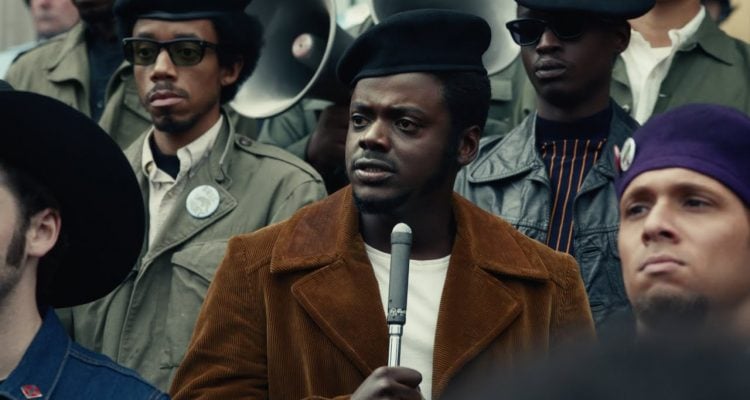An electrifying film, Judas and the Black Messiah is based on the history of the FBI and Chicago Police Department’s involvement in the 1969 assassination of deputy chairman of the Illinois Black Panther Party Fred Hampton. Under the direction of Shaka King, who co-wrote the movie with Will Berson (from a story by Keith and Kenneth Lucas) “Judas & the Black Messiah” gives viewers an inside look at the events leading up to the murder, while also reclaiming his story and memorializing him as an exuberant leader and revolutionary hero.
David Kaluuya, who was nominated by the Oscars for his role in Get Out, is Fred Hampton. Viewers can’t help but be mesmerized by his captivating performance as the 21-year-old martyr. As an active deputy chairman, Hampton was on the radar and often targeted by J. Edgar Hoover (played by Martin Sheen), who is shown instructing the FBI to take measures against the “Black Messiah.”
The film follows William “Bill” O’Neal (played by Lakeith Stanfield of “Sorry To Bother You” fame), a former car thief, who is recruited by FBI agent Roy Mitchell in 1968 (played by Jesse Plemon of “The Irishman”) to infiltrate the Panthers and help bring Hampton down. Like every movie, both characters have their own motive. Bill is doing this in hopes of avoiding jail time for stealing a vehicle; and Roy is using Bill to get close to Fred because he, CPD, and the FBI look at Hampton as a threat to their “way of life”. While infiltrating the group, Bill learns the values of the Black Panther Party and gains the trust of Fred and other members. In turn, he is recruited to head of security. During the process, Roy is pressuring Bill to gain incriminating information about Fred and the rest of the organization, but each attempt fails.
Throughout the film, it seems that everyone from Bill to Chicago leaders and the FBI is trying to figure out who Fred Hampton is and what his goals are. The Fred Hampton viewers meet is a natural-born leader, powerful orator, and critic of systemic racism. In addition to being at the forefront of the fight for equality, he is an educator to children who also feeds them with the party’s famed breakfast program and a unifier of diverse alliances with Black, Latino, and White activists with the Rainbow Coalition. He is a believer in action over words, and is willing to go to war for his beliefs, but also shy when it comes to love, shown in his relationship with his girlfriend and comrade Panther Deborah Jones (played by Dominique Fishback of Project Power). Kaluuya breathes life into his portrayal of Fred and shows his character is multifaceted, larger than life, and almost too complex to fit in a 126-minute movie.
Everything from the wide-screen frame of Sean Bobbit’s cinematography (director of photography of 12 Years a Slave), to the timely and fashionable costuming by designer Charlese Antoinette Jones, makes the viewer feel like they’ve stepped into the late sixties. Listed as cultural experts were Akua Njeri, formerly known as Deborah Jones, and Chairman Fred Hampton Jr. The research for the film was by Dr. Raymond A. Winbush. While watching, viewers know the dark fate to come at the end of the movie, but you can’t help but root for a change of events. It’s almost painful to watch Bill’s betrayal through his own conflicted perspective. At times, it feels as if Stanfield’s character’s alliance is switching, which is displayed when Bill is forced to take on a larger role in the organization during Fred’s temporary absence.
The complexity of Bill’s character forces the viewer to see this timeline of events through a conflicted and tortured lens. Judas and the Black Messiah at its purest is a beautiful tragedy that captivates audiences by plunging them into a time of a divided nation, clear destruction of Black lives, and corrupted American institutions built on white supremacy, which sadly echoes events happening in the United States today.
